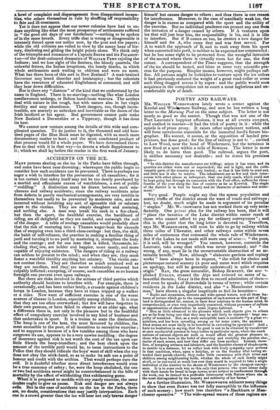ACCIDENTS ON THE ICE.
MANT persons skating on the ice in the Parks have fallen through, and some have been near drowning; whereupon the public begin to consider how such accidents can be prevented. There is perhaps too eager a wish to interfere for the prevention of all casualties ; for it is not certain that safety itself may not be too dearly purchased by a morbid and effeminate excess of watchfulness, a sort of public " coddling." A distinction must be drawn between such mis- chances and railway accidents ; since the railway accidents arise from defects in purely mechanical arrangements, are very terrible in themselves but easily to be prevented by moderate care, and are incurred without involving any sort of agreeable risk or salutary sport to the victims. They are simply slaughter and maiming, and nothing else. A man may break his neck in a fox-chase, but then the sport, the healthful exercise, the hardihood of riding, are all delightful as they are useful, and outweigh the evil of the danger. A table of average casualties would probably show that the risk of venturing into a Thames wager-boat far exceeds that of stepping even into a third-class carriage : but then, the skill, the habit of self-reliance, the practice in making a familiar thing of peril and turning it to no peril by mastering it, strengthen the body and the courage ; and for one man that is killed, thousands, in- cluding that: one, are bolder and happier, more manly, and more capable of enjoying existence. The dangers of riding on a railway can seldom be present to the mind ; and when they are, they must foster a watchful timidity anything but salutary. The victim can- not combat them. They are therefore as much unmixed evil as they are needless, and they; are never voluntarily incurred but culpably inflicted ; excepting, of course, such casualties as no human foresight can prevent even upon railways.
But there are risks involved in the actions of third parties which authority should hesitate to interfere with. For example, there is occasionally, and has been rather lately, a crusade against children's hoops in London, because they have at times tripped up a walker or a rider. Now want of sufficient exercise is one of the worst sources of disease in London, especially among children. It is true that they are too often overworked ; but few will have forgotten in their own persons, or have failed to observe at an older age, what a difference there is, not only in the pleasure but in the healthful effect of compulsory exercise involved in any kind of business and that undertaken in sport. It is a truism to state the distinction. The hoop is one of the best, the most favoured by children, the most accessible to the poor, of all incentives to recreative exercise ; and to suppress it because of a few tumbles among those who have outgrown its use, appears to be a very unwise meddling : the degree of insurance against risk is not worth the cost of the tax upon our little friends the hoop-trundlers; and the best check upon the amount of the terrible peril would be, to issue instructions to the Police that they should ridicule the boys' want of skill when the toy does not obey the stick-hand, so as to make its safe use a point of honour and credit with the urchins. That would perhaps cure the evil. It is doubtful whether more direct interference would even be- a true economy of safety ; for, were the hoop abolished, the one or'two bad accidents saved might be counterbalanced in the bills of mortality by the effect of withholding that exhilarating game. When it is proposed to meddle with any manly exercise, the same doubts ought to give us pause. Risk and danger are not always evils. But in the case of accidents on the ice in the Parks, there are, no- doubt, considerations that may justify interposition. Each one in a crowd greater than the ice will bear not only braves danger
himself but causes danger to others ; and thus there is one reason for interference. Moreover, in the case of manifestly weak ice, the danger is in excess as compared with the sport and the utility of the exercise. But no individual prudence can protect any one from the intrusion of a danger caused by others. If A ventures upon ice that will just bear him, the responsibility is his, and it is idle to interfere. But if B comes on too, he creates a new danger for himself and for A, who came first and was first served. For A to watch the approach of B, and to rush away from his sport when converted into peril, is neither to be expected nor commended : but he has some right to be protected from the wrongful intrusion of the second where there is virtually room but for one, the first comer. A correspondent of the Times suggests, that the strength of the ice should be tested, and hints at some very scientific pro- cess for the purpose. Simpler means, however, might perhaps suf- fice. All persons might be forbidden to venture upon the ice unless it had previously endured the weight of a great road-roller or some such thing dragged across it by ropes : and the public would soon acquiesce in the compulsion not to court a most inglorious and un- comfortable style of death.


























 Previous page
Previous page